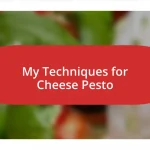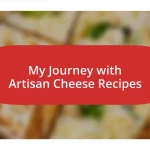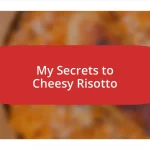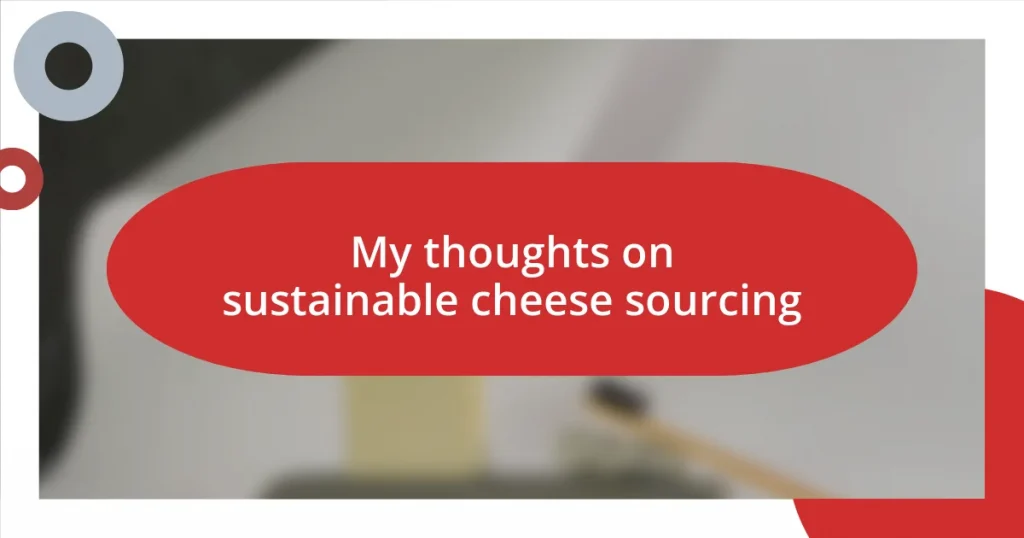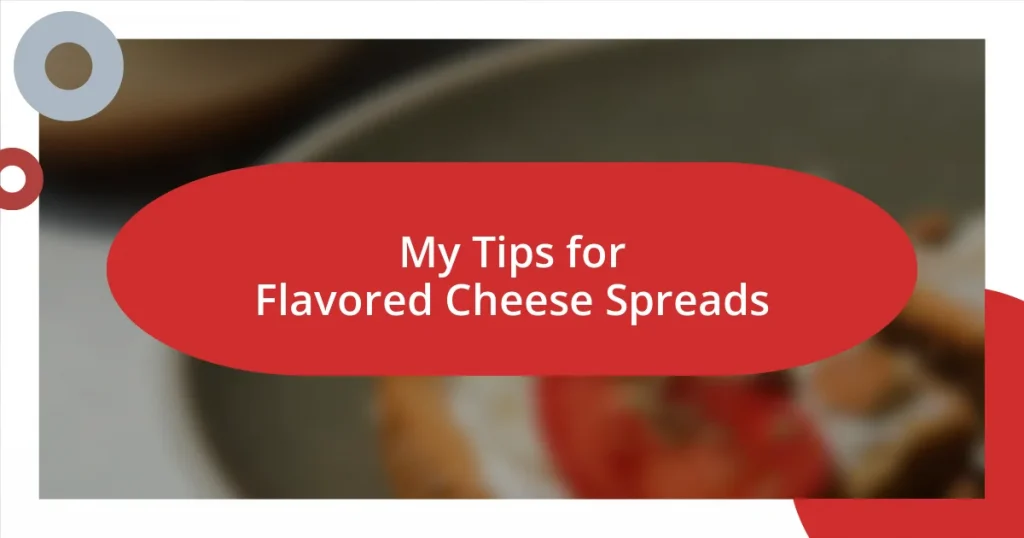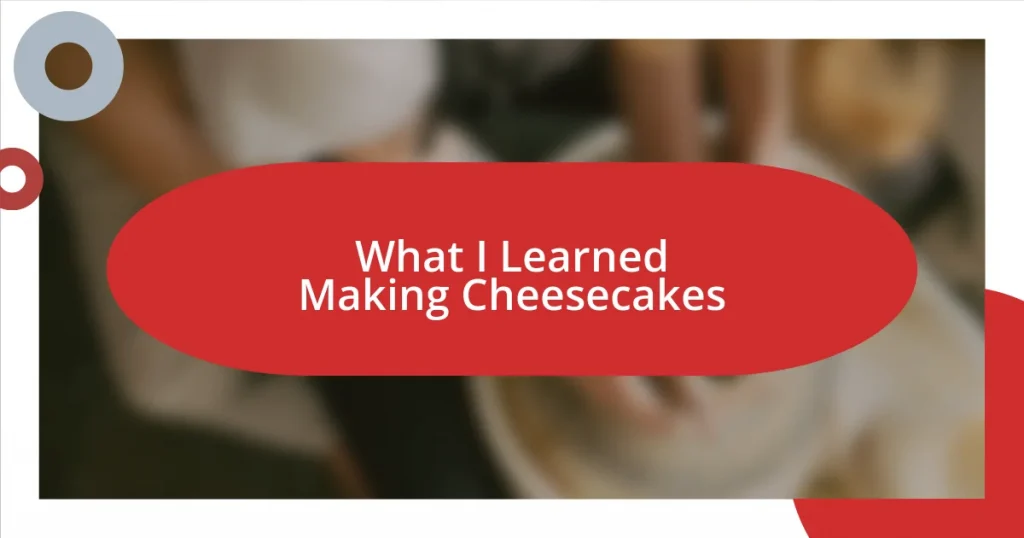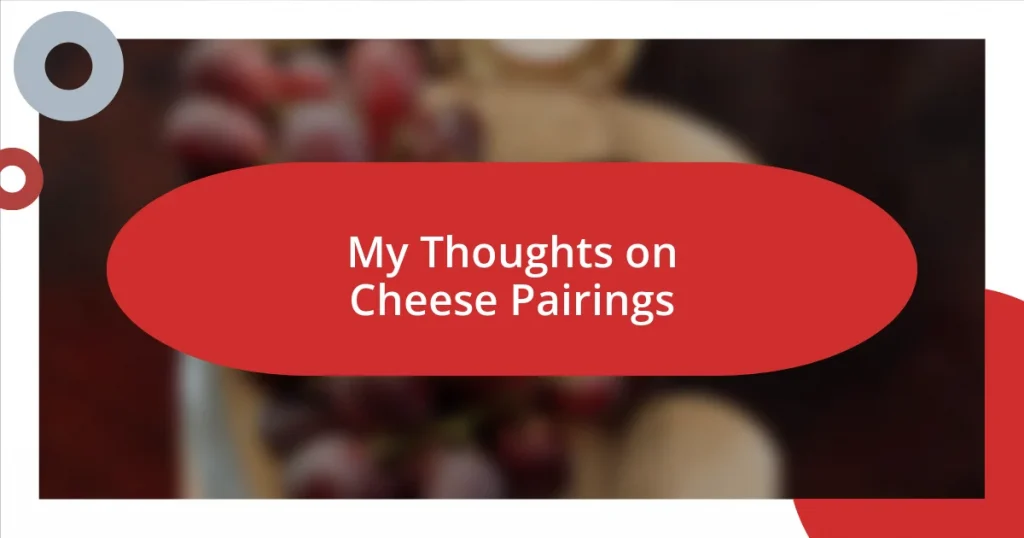Key takeaways:
- Sustainable cheese sourcing emphasizes ethical practices that benefit the environment and animal welfare, enhancing taste and supporting local farmers.
- The choice of cheese impacts biodiversity and local ecosystems, with practices like rotational grazing promoting animal health and enriching soil.
- Consumers can identify sustainable cheese brands by researching sourcing practices, seeking certifications, and engaging with producers, fostering a connection to the food they consume.
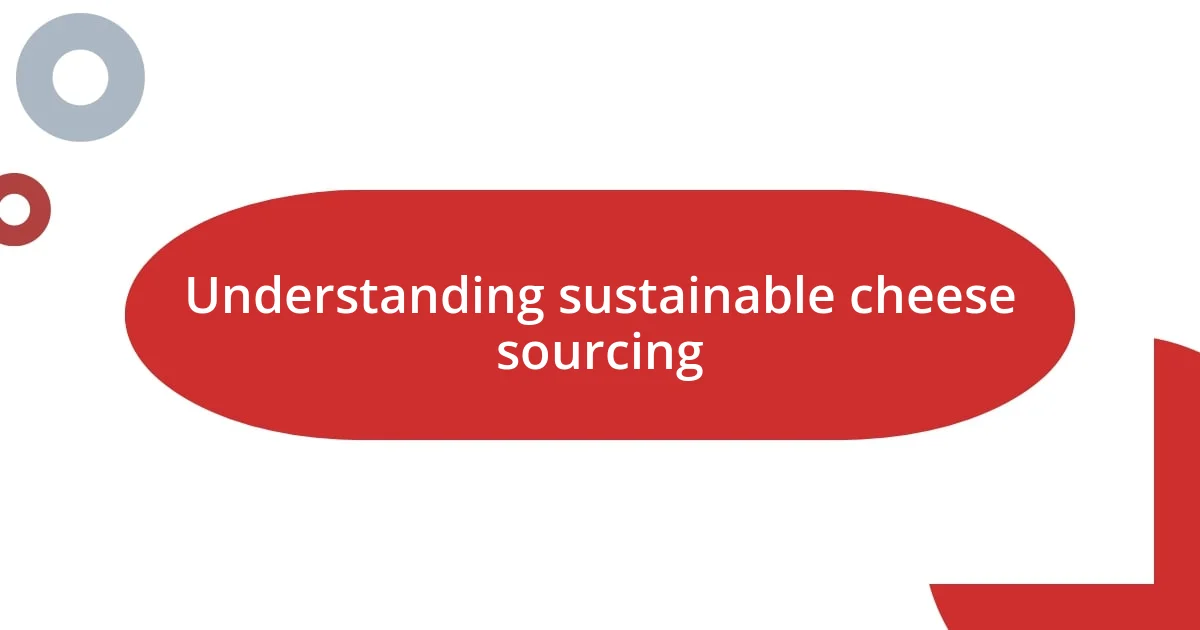
Understanding sustainable cheese sourcing
Sustainable cheese sourcing is all about being mindful of how cheese is produced, focusing on ethical practices that benefit both the environment and animal welfare. I remember visiting a small dairy farm where cows grazed freely on lush pastures—not only did the cheese taste phenomenal, but the entire operation felt harmonious with nature. Isn’t it heartening to know that every bite of sustainably sourced cheese can support farmers who prioritize the planet?
When we talk about sustainability, it’s essential to consider the entire supply chain, from the feed the cows consume to the energy used in production. I once spoke with a cheesemaker who sourced ingredients locally, reducing transportation emissions and supporting the community. Isn’t it fascinating how something as simple as a cheese selection can ripple through local economies and ecosystems?
Furthermore, the choice of cheese can deeply impact biodiversity. I often pondered this while enjoying a richly flavored artisan cheese, wondering how its ingredients played a role in preserving regional flora and fauna. Can you imagine the story behind each cheese wheel, reflecting a commitment to sustainable practices? Each variety you choose can be a step toward preserving our planet’s delicate balance.
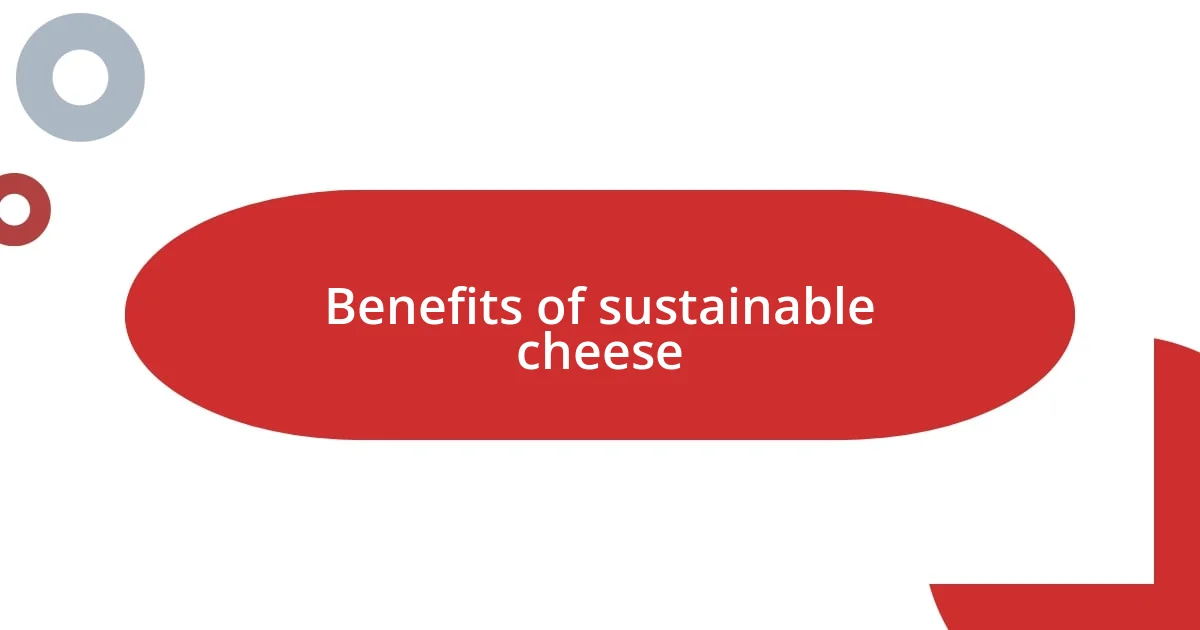
Benefits of sustainable cheese
Sustainable cheese offers a plethora of benefits that resonate deeply with both personal values and collective well-being. For instance, every time I bite into a wedge of sustainably sourced cheese, I’m reminded of the connection it fosters between consumers and producers. It’s uplifting to know that by choosing sustainable options, I’m supporting farmers committed to ethical practices and animal welfare while also enjoying a product that’s often tastier and fresher than mass-produced alternatives.
One standout benefit that often goes unnoticed is the positive impact on the environment. I recall a visit to an eco-conscious dairy where they used renewable energy to power their facilities. The cheesemaker proudly shared how this approach not only reduced their carbon footprint but also led to lower operational costs. Imagine enjoying a creamy brie or a tangy goat cheese, all while knowing that your choice contributes to a healthier planet. It’s a small act that can have profound effects.
Moreover, sustainable cheese production often prioritizes biodiversity, which benefits local ecosystems. I remember the vibrant landscapes I encountered during a farm tour filled with wildflowers and varied grasses, which were essential to the cows’ diet. The cheese produced there not only delighted my palate but also played a role in preserving local flora and fauna. When I indulge in such cheese, I feel a sense of responsibility and satisfaction knowing I’m supporting these vital ecosystems.
| Benefits | Description |
|---|---|
| Supports Local Economies | Choosing sustainable cheese helps uplift local farmers and communities. |
| Enhances Flavor | Often, sustainably sourced cheese has a fresher, richer taste due to ethical production practices. |
| Promotes Biodiversity | Sustainable cheese production encourages the preservation of local ecosystems and wildlife. |
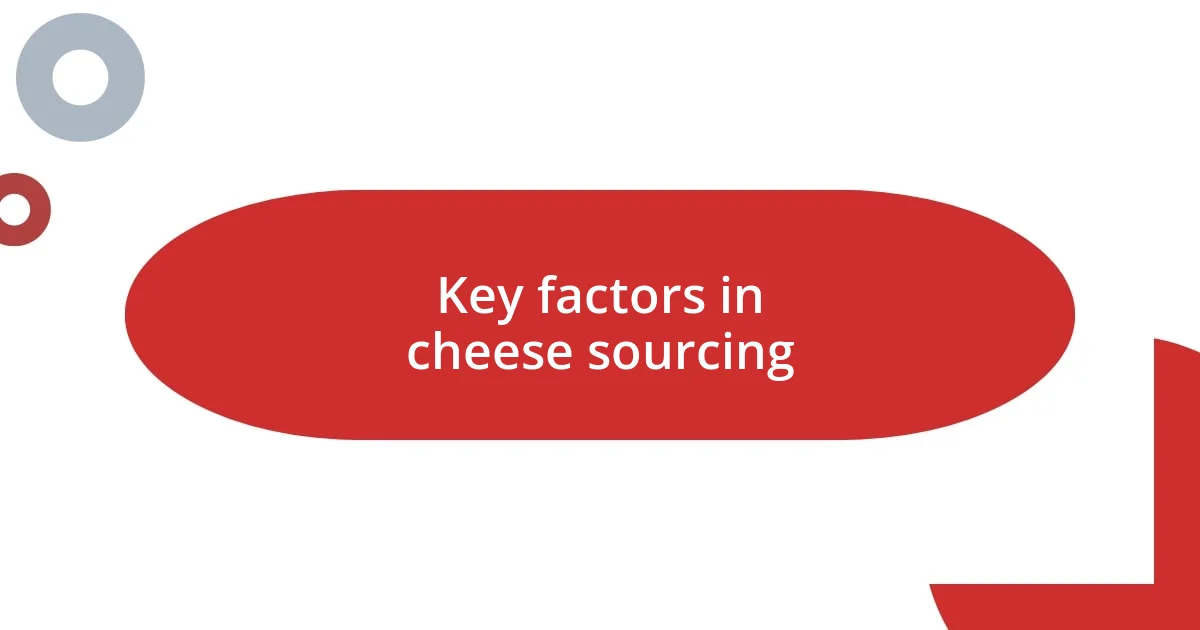
Key factors in cheese sourcing
When I think about key factors in cheese sourcing, a few elements immediately come to mind. First and foremost, the origin of the milk is crucial. I recall a charming cheese shop I visited where the owner proudly showcased cheeses made from milk sourced exclusively from nearby farms. The passion and transparency in their sourcing made me appreciate each bite so much more. Another vital aspect is the farming practices themselves; I’ve spoken with many farmers who emphasize rotational grazing techniques, which not only benefits animal health but also enriches the soil. It’s like tasting a piece of land that’s been nurtured.
Key Factors in Cheese Sourcing:
– Milk Source: Local and sustainably managed farms ensure quality and freshness.
– Farming Practices: Techniques like rotational grazing promote animal welfare and soil health.
– Production Methods: Traditional methods often yield richer flavors and minimize environmental impact.
– Transparency: Knowing the story behind each cheese fosters a deeper connection between the consumer and producer.
Additionally, the type of feed given to the cows is something I’ve become increasingly aware of. During a delightful evening at a cheese tasting event, I learned how some brands use organic feed, which not only enhances milk quality but also reduces pesticide exposure. That night, as I savored a creamy gouda, I marveled at how every flavor was tied to the choices producers made in sourcing these feeds. It felt rewarding to know that my preferences were also aligning with practices that encourage healthier ecosystems.
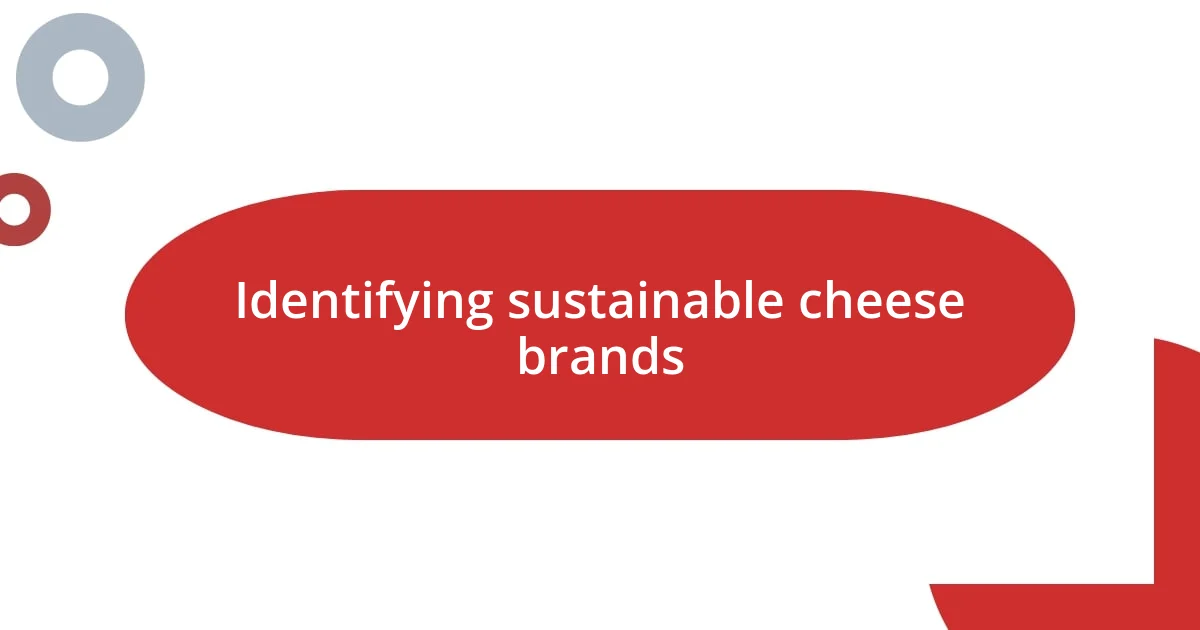
Identifying sustainable cheese brands
Identifying sustainable cheese brands often starts with researching their sourcing practices. I remember the thrill of discovering a local cheese maker whose commitment to sustainability was evident in every aspect of their production. Their website not only detailed the farms they partnered with but even featured stories about the farmers. This sense of transparency allowed me to feel a genuine connection, making each taste even more meaningful.
Moreover, seeking certifications can be a reliable way to spot sustainable brands. When I encountered a cheese at my favorite market boasting organic and animal welfare certifications, it felt like a little badge of honor for the product. But certifications aside, I also encourage looking for brands that actively engage in community initiatives. I recently visited a cheese festival where several producers highlighted their efforts, like supporting local schools or donating to conservation projects. It reminded me that sustainable sourcing is as much about community as it is about the environment.
Finally, don’t underestimate the power of flavors and aromas in identifying sustainable cheese. I think back to a cheese tasting where the rich, complex flavors were directly attributed to the pasture-raised cows and their diverse diets. It made me question: how can something so delicious also mean a commitment to the earth? I now find that the more I explore these flavors, the more I appreciate the stories behind them. Choosing sustainable cheese isn’t just a decision; it’s an experience that deepens my appreciation for what’s on my plate.
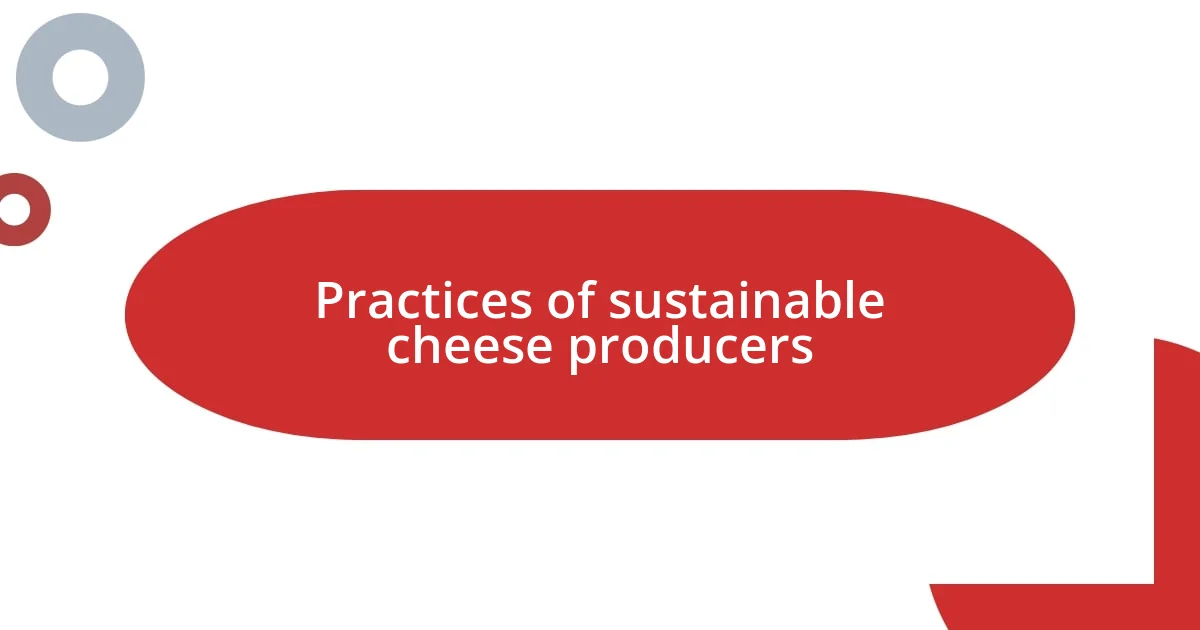
Practices of sustainable cheese producers
Sustainable cheese producers often embrace innovative methods that respect both the environment and animal welfare. I once visited a small dairy farm where the cheesemaker explained how they implemented solar panels to power their facilities. Watching them enthusiastically describe how sunlight turns into energy to make cheese felt like witnessing a beautiful harmony between tradition and modernity. It made me realize how sustainable practices can not only reduce carbon footprints but also inspire a new generation of cheese lovers.
In my exploration of sustainable cheese, I’ve come across producers who prioritize biodiversity in their grazing practices. At a farm tour, a farmer shared how maintaining various plants in the pasture contributes to the cows’ health and the cheese’s flavor. I couldn’t help but think, how many layers of flavor come from the simple act of letting cows roam freely among diverse plants? This not only benefits the animals but ultimately enriches the cheese experience for us connoisseurs.
Another fascinating practice is the water conservation methods used by some cheesemakers. I recall a conversation with a producer who used rainwater harvesting systems, drastically reducing their reliance on municipal water sources. Hearing their passion for sustainability was infectious. It made me ponder: could our choices in cheese consumption truly drive more sustainable farming practices? It certainly felt empowering to know that by supporting these producers, I was playing a part in a larger movement towards environmental stewardship.
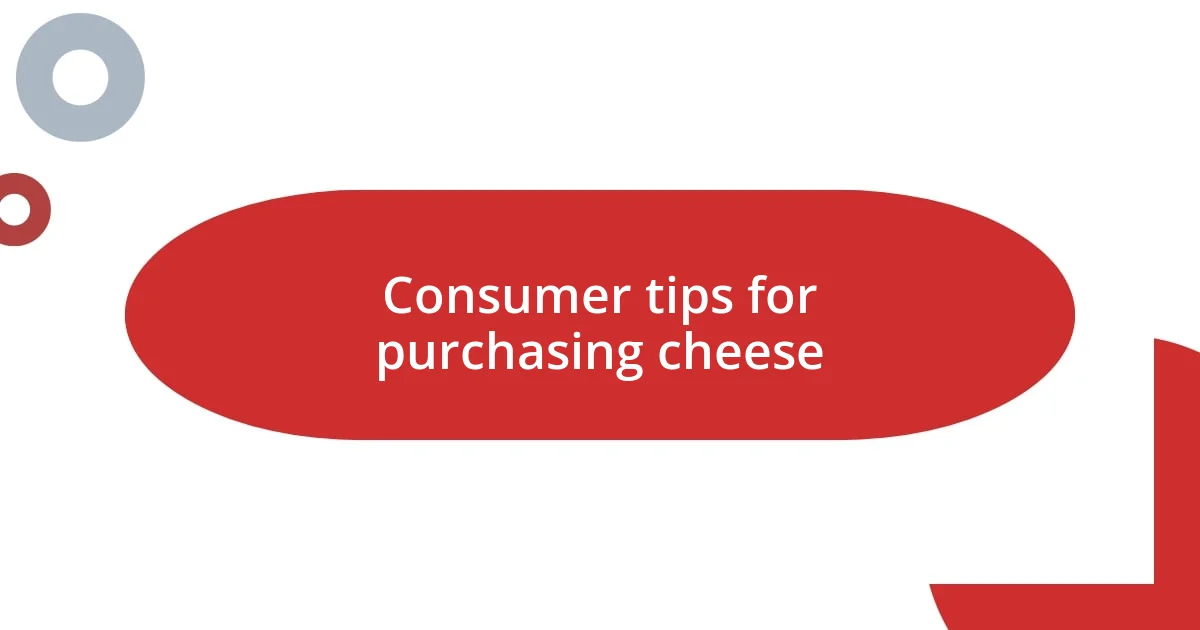
Consumer tips for purchasing cheese
When purchasing cheese, I always recommend checking the labeling closely. Recently, while browsing a local market, I noticed a cheese that stood out because it proudly displayed the “grass-fed” label. It sparked my curiosity, and I found out that the flavor profile was enhanced by the natural diet of the cows. It made me think about how sometimes, just a few words on a label can lead to a richer and more fulfilling cheese experience.
Another tip is to engage with the vendors at farmers’ markets or artisan cheese shops. I remember one memorable visit where the seller enthusiastically shared stories about each cheese and its origins. Their passion not only educated me but also transformed my buying decision into a personal connection with the product. Have you ever realized how much more meaningful it is to know the story behind what you’re eating? It’s this intriguing blend of flavor and narrative that elevates the entire experience.
Lastly, don’t shy away from asking questions about the cheese’s sourcing methods. I once inquired about a special cheese that caught my eye, only to discover it was sourced from a cooperative of family farms committed to sustainable practices. This not only satisfied my taste buds but also my desire to support ethical food sourcing. How wonderful it is to know that each bite contributes to the well-being of our planet! Taking the time to ask these questions empowers us as consumers to make informed choices while enjoying our cheese.
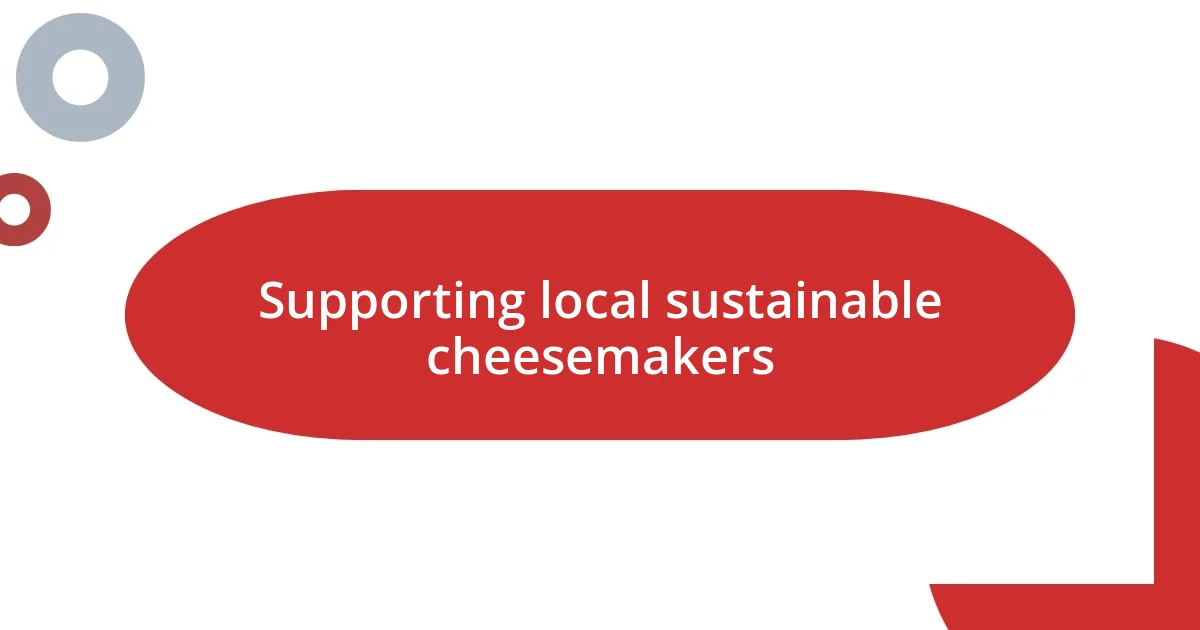
Supporting local sustainable cheesemakers
Supporting local sustainable cheesemakers creates a meaningful connection between the cheese on our plates and the farmers who produce it. I remember a day spent at a cheese festival where I met a passionate cheesemaker from my area. Listening to her describe the revitalization of an old family farm struck a chord with me; she believed every wheel of cheese reflected her commitment to sustainability and community support. Have you ever thought about how our choices support local artisans? It’s incredibly rewarding to know that our purchases can empower those dedicated to ethical practices.
During one of my visits to a nearby goat cheese farm, I was captivated by the cheesemaker’s dedication to using traditional methods while respecting animal welfare. I watched as he interacted lovingly with his goats, ensuring they were healthy and happy. It made me think: how often do we consider the relationship between animal well-being and the quality of the cheese we consume? Supporting such local producers not only provides delicious cheese but fosters a system where compassion and sustainability thrive hand in hand.
What truly strikes me is the sense of community built around these local cheesemakers. At a recent cheese-tasting event, I met several individuals who were equally enthusiastic about supporting local dairy farms. We all shared stories of our favorite cheeses and the ways these small producers impacted our lives. It was a heartwarming reminder of how our collective support fosters local economies and sustains traditions. Isn’t it delightful to think that each cheese we savor contributes to a larger narrative of sustainability and community? That’s something I cherish with every bite.





